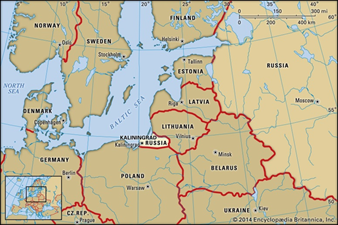

30th June 2022 (5 Topics)
Context
Cutting off Kaliningrad as a result of EU sanctions has elevated the possibility of a direct conflict between Russia and NATO.
About
- Lithuania, a member of the European Union (EU) and the North Atlantic Treaty Organisation (NATO), recently banned goods subject to EU sanctions from passing through its territory to the Russian exclave Kaliningrad.
- Sanctioned goods include coal, metals, construction materials and advanced technology.
- Russia has called the move a “blockade” and promised a stern response.
- According to Russian officials, the ban will affect 30-50 per cent of cargo traffic but the goods can be rerouted through the Baltic Sea.
- The implementation of sanctions has strained EU-Russia relations even further.

Importance of Kaliningrad:
- Kaliningrad is an exclave of Russia, completely separated from the country’s mainland.
- It is situated between EU and NATO members Lithuania and Poland.
- It is also the headquarters of Russia’s Baltic Sea fleet, and the country’s only ice-free European port.
- Kaliningrad has a population of approximately one million. Since it does not share a border with Russia, it also relies on the EU for supply of goods.
- In the past, Russia has deployed its short-range Iskander missiles in Kaliningrad, believed to be a threat to the U.S.
Russia’s response
- Russia has threatened to take measures against Lithuania for implementing a “blockade” and cutting off Kaliningrad.
- Cutting off Kaliningrad has elevated the possibility of a direct conflict between Russia and NATO, since the country has threatened to respond to the “hostile actions” with “appropriate measures.”
- Russia has also blamed the U.S. for the rail transit ban imposed by Lithuania.
- Russian hacker group Killnet took responsibility for attacking Lithuania’s public services with a distributed denial-of-service (DDOS) attack.
- The group said that the attack was in response to the rail transit ban.
- They also threatened that the attacks will continue until Lithuania lifts the ban.


